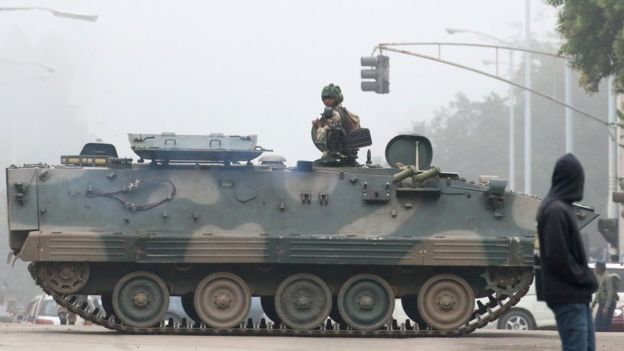
The military has seized control in Zimbabwe but has said President Robert Mugabe, in power since 1980, is safe.
After seizing state TV, an army spokesman announced it was targeting people close to Mr Mugabe who had caused “social and economic suffering”.
The move came after Mr Mugabe sacked his deputy, Emmerson Mnangagwa, in favour of his wife, Grace.
Heavy gun and artillery fire could be heard in northern parts of the capital Harare early on Wednesday.
A statement read out by a general on air denied it was a coup and said Mr Mugabe was safe but did not say where.
There was no immediate word from Mr Mugabe himself.
Mr Mugabe, 93, has dominated the impoverished country’s political scene since independence from the UK.
The UK Foreign Office advised Britons “currently in Harare to remain safely at home or in their accommodation until the situation becomes clearer”, while the US embassy in Harare advised US citizens in Zimbabwe to “shelter in place” until further notice.
How did the military justify its move?
Soldiers overran the headquarters of the ZBC broadcaster after armoured vehicles took up position on roads around Harare on Tuesday.
Maj Gen Sibusiso Moyo went on air to say the military wished to “assure the nation that his Excellency the president… and his family are safe and sound and their security is guaranteed”.
“We are only targeting criminals around him who are committing crimes… that are causing social and economic suffering in the country,” he said.
“As soon as we have accomplished our mission, we expect that the situation will return to normalcy.”
Other key points of the statement included:
- Citizens should remain calm and limit unnecessary movement
- The military assures the Zimbabwean judiciary that its independence is guaranteed
- Security services should “co-operate for the good of our country” and any provocation would “be met with an appropriate response”
- All leave for the defence forces is cancelled and personnel should return to barracks immediately
It is not clear who is leading the military action. Army chief Gen Constantino Chiwenga had said the army was prepared to act to end purges within the ruling Zanu-PF party.
Who else has been detained?
A government source told Reuters news agency that Finance Minister Ignatius Chombo had been detained.
He is a leading member of a faction of Zanu-PF led by Mr Mugabe’s wife Grace.
Is this a coup?
Alex Magaisa, former adviser to Zimbabwean opposition leader Morgan Tsvangirai, told the BBC he did not believe the military’s claim that they had not carried out a coup.
“They have decided not to call it a coup because they know that a coup does not sell, it will be condemned,” he said.
“But as far as authority is concerned it seems very clear that President Mugabe is now just a president in name and authority is now residing in the military.”
Zanu-PF had accused Gen Chiwenga of “treasonable conduct” after he issued his warning that the army might intervene.
What do we know of the fighting?
The firing was coming from northern suburbs where Mr Mugabe and a number of government officials live, the BBC’s Shingai Nyoka reports from Harare.
A witness told AFP news agency it could be heard near Mr Mugabe’s residence in the suburb of Borrowdale early on Wednesday,
Some staff at ZBC were manhandled when the soldiers moved in, sources told Reuters. Workers were told that they “should not worry”, a source added, and that soldiers were only there to protect the site.
What was the political situation before the army acted?
Mr Mugabe sacked Mr Mnangagwa last week, amid a row over succession.
Mr Mnangagwa had previously been seen as an heir to the president, but First Lady Grace Mugabe had since become the clear front-runner.
The rivalry between Mrs Mugabe and Mr Mnangagwa has split Zanu-PF.
Last month, Mrs Mugabe had warned of a possible coup plot, saying allies of Mr Mnangagwa were threatening the lives of those who didn’t support him.
Zanu-PF said Gen Chiwenga’s comments were “calculated to disturb national peace… [and] incite insurrection”.
The party said it would never succumb to military threats, and that it “reaffirms the primacy of politics over the gun”.
Gen Chiwenga had said the “purging” within Zanu-PF was “clearly targeting members of the party with a liberation background”, referring to the country’s struggle for freedom from white minority rule.
Mr Mnangagwa is one such veteran of the 1970s war which ended white minority rule.
Source: BBC



